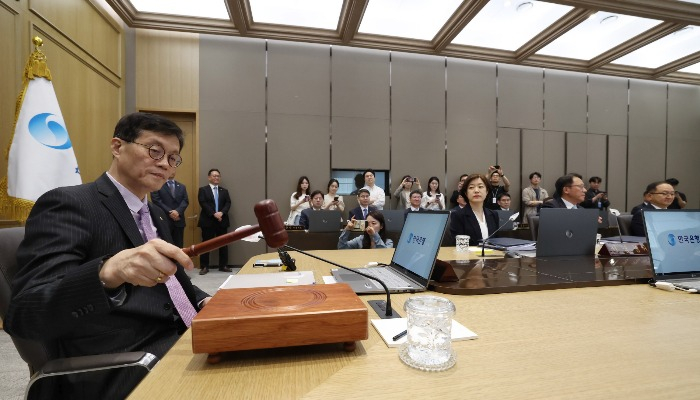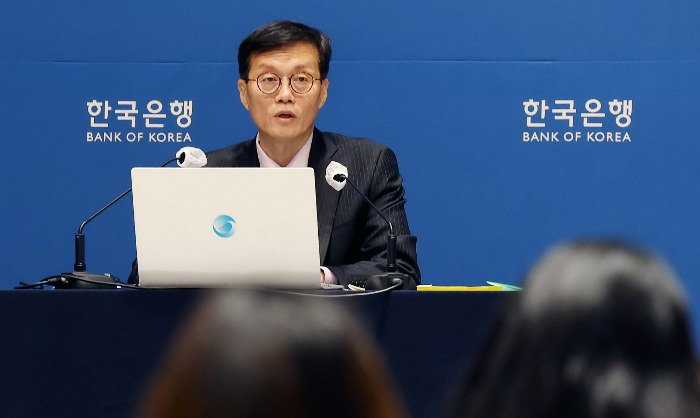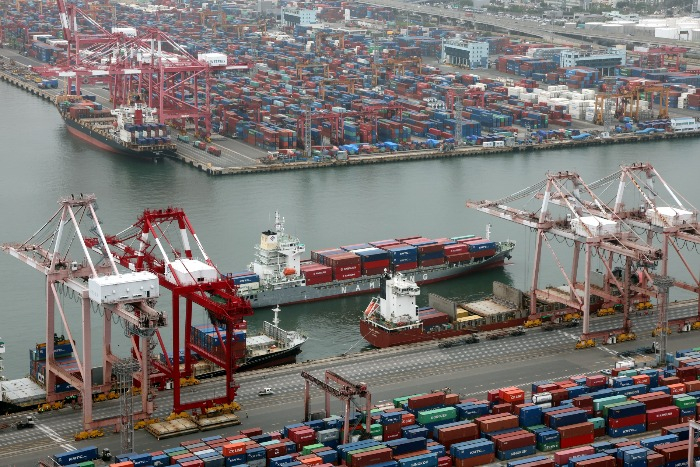BOK leaves door open for another quarter-point rate rise
Market analysts are debating whether or not the tightening cycle has come to an end
By May 25, 2023 (Gmt+09:00)
MBK’s Korea Zinc takeover attempt to spur search for white knights


Korea Zinc, MBK face proxy war for zinc smelter


Korea Zinc shares skyrocket after buybacks in tender offer


Lotte to liquidate rubber JV in Malaysia, sell overseas assets for $1 bn


Samsung to unveil 400-layer bonding vertical NAND for AI servers by 2026



The Bank of Korea’s (BOK) decision on Thursday to keep its base rate steady at 3.50% does not signal the end of its one-and-a-half-year tightening cycle, its Governor Rhee Chang-yong said.
The central bank is open to another quarter-point rate rise to 3.75%, which its monetary policy committee members, excluding Rhee, expect would be the peak of its tightening steps started in August 2021.
“It’s too early to talk about starting to cut interest rates until before we have clear indicators of (consumer) prices stabilizing at the 2% level,” he told reporters in a press conference following the rate decision.
His remarks come after BOK lowered its economic growth forecast by 0.2 percentage point to 1.4% for 2023.
The revised forecast is slightly below the International Monetary Fund’s (IMF) latest projection of 1.5%, lowered from its previous forecast of 1.7%.
Amid signs of eased inflationary pressure, BOK’s monetary policy committee unanimously decided to leave its policy rate unchanged at 3.50%.
It froze the key interest rate in February and April of this year, after raising the rate by 3 percentage points through 10 hikes since August 2021.
MIXED REACTION
Rhee's remarks failed to dampen market expectations of a rate cut later this year.
Some analysts took note of BOK’s cut of economic growth forecast, which they said would bring forward an interest rate cut to as early as October of this year.
Rhee noted that the committee members agreed to hold off on a new rate move, waiting for the US Federal Reserve's new monetary steps. BOK also needs more time to monitor the effects of the string of its interest rate hikes.

Earlier this month, Governor Rhee defied market talk of switching into monetary easing.
“Consumer price growth has been slowing, but headline inflation eased at a slower pace than expected,” the governor said during the press conference.
South Korea’s inflation in April eased to 3.7%, its lowest reading in 14 months and close to BOK’s target of 3.5% for 2023.
The projected 2023 consumer inflation will mark the strongest reading since 4.0% in 2011, except for 2022 when it came in at 5.1%.
Wholesale inflation, or the producer price index, dipped 0.1 percentage points to 1.6% in April from a month before. It was the weakest level in 15 months.

NO REVISION TO 2023 CPI TARGET
In March, the current account balance turned to the black, snapping two consecutive months of deficits, thanks to dividend payments from overseas subsidiaries of South Korean companies.
But the country posted trade deficits on a customs-cleared basis for 14 months in a row in April, hit by declining shipments of semiconductor chips, the country’s bread and butter.
For 2024, the central bank stuck with its forecast of 2.3% economic growth. It forecast the CPI to come in at 2.4% next year.
(Updated with Bank of Korea governor's comments)
(The fourth paragraph was corrected to say the forecast was revised by 0.2 percentage point)
Write to Jin-Gyu Kang at josep@hankyung.com
Yeonhee Kim edited this article
-
 Upcoming IPOsCuckoo eyes $172 mn IPO of Malaysian unit in Kuala Lumpur: Bloomberg
Upcoming IPOsCuckoo eyes $172 mn IPO of Malaysian unit in Kuala Lumpur: BloombergOct 30, 2024 (Gmt+09:00)
-

-

-

-
 RegulationsHeavy inheritance, gift taxes spur rich Koreans to emigrate to Singapore
RegulationsHeavy inheritance, gift taxes spur rich Koreans to emigrate to SingaporeOct 22, 2024 (Gmt+09:00)


